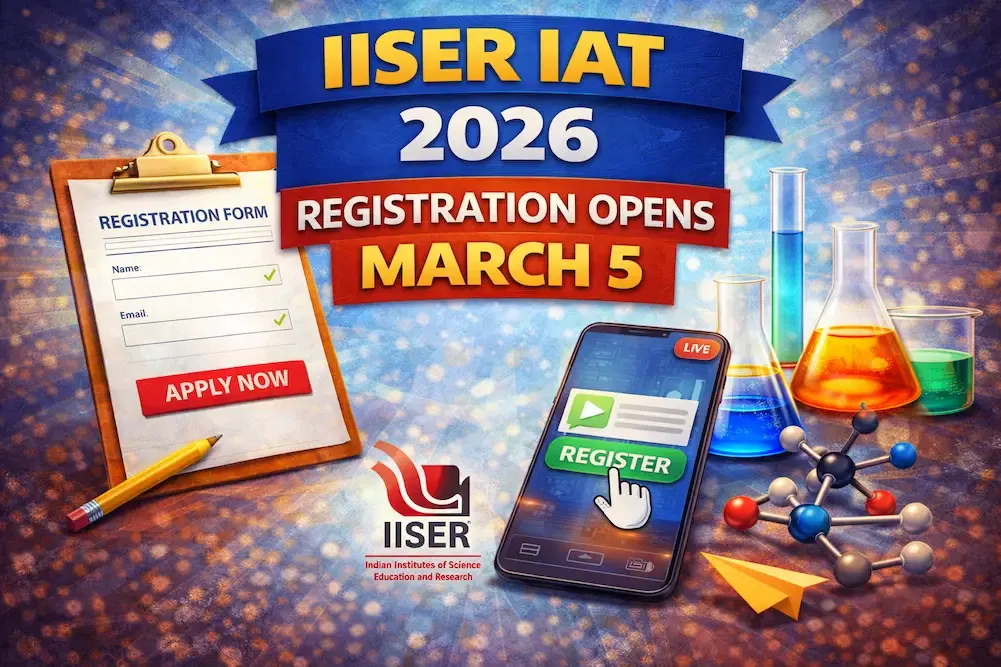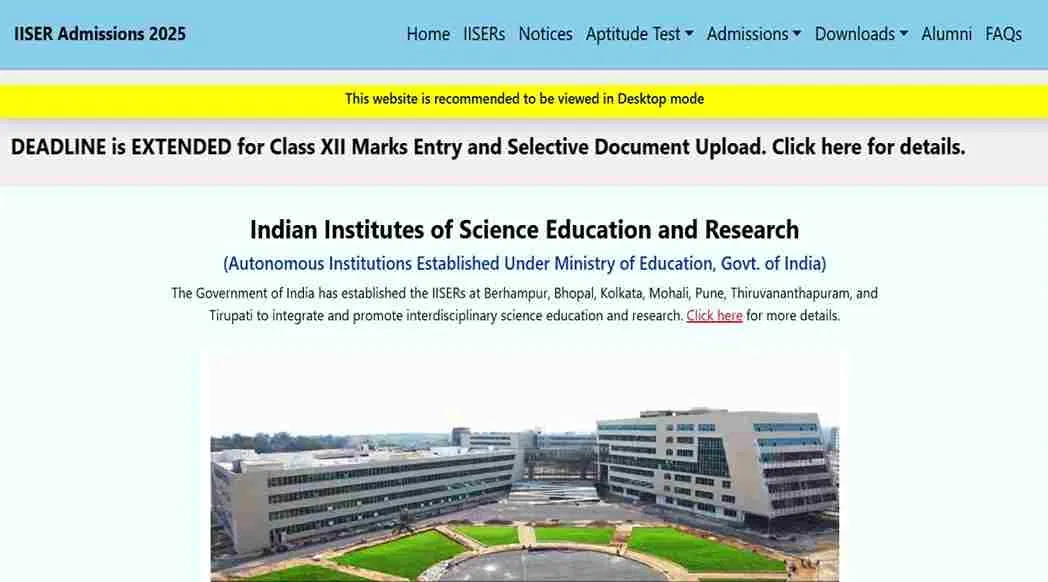
Table of Contents
IISER Previous Year Question Papers assist the candidates appearing for the IISER exam in preparing and acing it. IISER previous year question papers work as a strategic approach in getting familiarised with the format of the questions, which assists the candidates to feel less nervous on test day.
Previous year question papers help the students identify their strengths and weaknesses. The students can prepare accordingly for the IISER exam. The candidates can also refer to the IISER answer key provided on the official website to cross-check their solved papers.
IISER Previous Year Question Papers
Given below are the previous years’ question papers for year 2024,2023, 2022, 2021, 2019 2018, and 2017 in PDF format in English. Download the IISER question paper for previous years from the links given below:
| Year | Download IISER Papers (English) |
| 2024 | Click Here |
| 2023 | Click Here |
| 2022 | Click Here |
| 2021 | Click Here |
| 2019 | Click Here |
| 2018 | Click Here |
| 2017 | Click Here |
Given below are the previous years’ question papers for years 2023, 2022, 2021, 2019 2018, and 2017 in PDF format in Hindi. Download the Hindi IISER question paper for previous years from the links given below:
| Year | Download IISER papers (Hindi) |
| 2023 | Click Here |
| 2022 | Click Here |
| 2021 | Click Here |
| 2019 | Click Here |
| 2017 | Click Here |
Benefits of Solving IISER Previous Year Question Paper
Solving previous year's question papers is helpful in improvement. in exam scores. The candidates can study and analyse IISER previous year's question papers to perform much better in their IISER attempt. Here are some benefits of solving previous IISER papers:
- Students can understand the general format of the IISER Aptitude Test (IAT) and the type of questions that are generally asked.
- Students can identify their areas of strength and weaknesses by solving the previous year's question paper.
- It helps the candidates to practice and solve problems in a similar environment to the actual exam.
- It boosts candidates’ confidence levels and gets them familiarised with the test pattern.
- It helps the candidates manage their time well while solving past years' papers so that they can manage their time effectively on exam day.
- Students can understand the topics that are most common in the test and questions that are generally repeated.
IISER Exam Pattern Highlights
Candidates appearing for IISER 2024 will be given 3 Hours for 60 objective questions. There will be a negative marking of -0.75 marks for each incorrect answer. However, no marks will be deducted for unanswered questions.
The candidates can refer to the IISER exam pattern 2024 highlights given below in the table.
| Mode of Exam | Computer Based Test |
| Exam Type | Objective |
| Number of Questions | 60 |
| Total Marks | 180 |
| Medium | English/Hindi |
| Duration | 3 Hours |
IISER Question Paper Pattern
There are 60 questions in the IISER question paper which will be divided into 4 sections with 15 questions in each section. The candidates can refer to the IISER question paper pattern given below.
| Sections | Number of Questions | Marks |
| Physics | 15 | 45 |
| Chemistry | 15 | 45 |
| Mathematics | 15 | 45 |
| Biology | 15 | 45 |
| Total | 15 | 180 |
IISER Exam Preparation Tips
Applicants must plan their study schedule for the IISER exam. With the study of IISER's previous year's question papers, students must also follow the IISER Preparation tips, a few are given below to improve their exam scores and make the most of their preparation.
- Practice: To increase their effectiveness and strive to answer more questions in the test, applicants should practice answering more and more questions. Candidates can practise using the IISER question papers from the last ten years.
- Evaluation of Performance: Candidates can assess their performance and plan their exam strategy by working through the previous year's question papers. Candidates will also be able to comprehend the importance of certain topics and the weighting of others by analysing past years' exam questions.
- Exam Pattern: Candidates can concentrate their study on key subjects and questions by downloading last year's question papers and learning about the format and nature of the questions.
Also Read: IISER Mock Sample Tests
IISER Previous Year Question Papers: Important Topics
The candidates can refer to the list of important topics from the 4 sections of the IISER exam i.e. physics, chemistry, mathematics and biology from the IISER Syllabus 2024. By focusing on these important topics and employing effective study strategies, the candidates can increase their chances of excelling in the IISER aptitude test.
IISER Important Chapters of Physics
- Measurement and Units: Understanding fundamental units, dimensional analysis, measurement errors.
- Mechanics: Laws of motion, work, energy and power, momentum and impulse, circular motion, center of mass, gravitation.
- Properties of Matter: Elasticity, fluids, surface tension, viscosity.
- Thermal Physics: Kinetic theory of gases, laws of thermodynamics, specific heat capacity, change of state.
- Oscillations and Waves: Simple harmonic motion, superposition of waves, sound waves, light waves.
- Electrostatics: Electric charge, electric field, potential difference, Gauss's law, capacitance.
- Current Electricity: Ohm's law, Kirchhoff's laws, circuits, magnetic effects of current.
- Magnetism: Magnetic field, forces on a current-carrying conductor, electromagnetic induction.
- Modern Physics: Photoelectric effect, Bohr model of the atom, nuclear physics.
IISER Important Chapters of Chemistry
- Basic Concepts: Atomic structure, periodic table, chemical bonding (ionic, covalent, metallic), chemical nomenclature.
- States of Matter: Gaseous, liquid, and solid states, ideal gas laws, and colligative properties.
- Chemical Reactions: Stoichiometry, balancing equations, types of reactions (redox, precipitation, acid-base).
- Equilibrium: Chemical equilibrium, Le Chatelier's principle.
- Acids and Bases: Brønsted-Lowry and Lewis concept of acids and bases, pH, salts, hydrolysis.
- Redox Reactions: Oxidation and reduction, balancing redox equations.
- Organic Chemistry: Basic concepts, structure and properties of functional groups (alcohols, aldehydes, ketones, carboxylic acids, amines).
- Chemical Kinetics: Rates of reactions, factors affecting reaction rates, order of reactions.
- Inorganic Chemistry: Classification of elements, s-, p-, d-, and f-block elements, important compounds of some elements.
IISER Important Chapters of Mathematics
- Algebra: Set theory, complex numbers, quadratic equations, inequalities, permutations and combinations, matrices and determinants.
- Calculus: Differential calculus (limits, differentiation, applications of derivatives), integral calculus (integration, applications of integrals).
- Trigonometry: Identities, trigonometric functions, graphs, applications.
- Coordinate Geometry: Straight lines, circles, parabolas, hyperbolas.
- Vector Algebra: Vectors, scalar and vector products, applications.
- Probability and Statistics: Basic concepts of probability, permutation and combination, central tendency, dispersion.
IISER Important Chapters of Biology
- The Cell: Cell structure and function, cell cycle, cell division (mitosis and meiosis).
- Biomolecules: Carbohydrates, proteins, lipids, nucleic acids.
- Genetics: Mendelian inheritance, chromosomal theory of inheritance, sex determination, mutations.
- Molecular Biology: DNA structure and replication, RNA structure and function, protein synthesis.
- Evolution: Darwin's theory of evolution, natural selection, evidence of evolution.
- Ecology: Ecosystems, food chains and food webs, biodiversity, environmental issues.
- The Human Body: Structure and function of major organ systems (digestive, circulatory, respiratory, excretory, nervous, endocrine, reproductive).
- Plant Biology: Structure and function of plant organs, photosynthesis, respiration, transport in plants, plant reproduction.




























